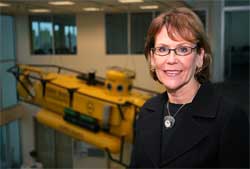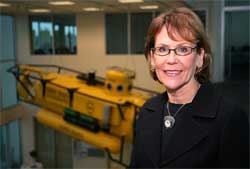 KINGSTON, R.I. – February 7, 2011 — Margaret Leinen, founder of the Climate Response Fund and executive director of the Harbor Branch Oceanographic Institute at Florida Atlantic University, will present a lecture entitled “Should We Engineer the Climate?” at the University of Rhode Island on Feb. 15 at 7:30 p.m.
KINGSTON, R.I. – February 7, 2011 — Margaret Leinen, founder of the Climate Response Fund and executive director of the Harbor Branch Oceanographic Institute at Florida Atlantic University, will present a lecture entitled “Should We Engineer the Climate?” at the University of Rhode Island on Feb. 15 at 7:30 p.m.
Her presentation, in Edward’s Auditorium on the URI Kingston campus, is part of the University’s Vetlesen lecture series on “The State of the Oceans” in conjunction with the 50th anniversary of the Graduate School of Oceanography. The event is free and open to the public.
In her lecture, Leinen will argue that the impact of climate change will be so severe that we should conduct research into climate engineering. She will describe geoengineering, its prospects, its dangers and how it should be controlled.
“The scientific community has begun to discuss the possibility of engineering the climate to avoid dangerous impacts of climate change,” said Leinen. “Would this
radical strategy work? What would be the environmental consequences of such engineering? Are there any mechanisms that could be used to govern climate engineering? What norms or ethical principles must be considered?”
Formerly dean of the Graduate School of Oceanography and associate provost for marine and environmental programs at URI, Leinen founded the Climate Response Fund to foster discussion of climate engineering research and to decrease the risk that these techniques might be deployed before they are adequately understood or regulated.
Previously, Leinen was chief science officer of Climos, Inc. and assistant director for geosciences at the National Science Foundation. In this latter post, she was responsible for leadership of the International Group of Agencies for Global Change Research and defending the advocating for major research into climate change.
She earned a Ph.D. in oceanography from URI, a master’s degree in geological oceanography from Oregon State University, a bachelor’s degree in geology from the University of Illinois.
 The lecture series is sponsored by the G. Unger Vetlesen Foundation, with individual lectures supported by the URI College of Arts & Sciences, the Harrington School of Communication, and Rhode Island Sea Grant. The series is coordinated by Professors Steven D’Hondt, Arthur Spivack and Judith Swift, and Sunshine Menezes, director of the Metcalf Institute for Marine & Environmental Reporting.
The lecture series is sponsored by the G. Unger Vetlesen Foundation, with individual lectures supported by the URI College of Arts & Sciences, the Harrington School of Communication, and Rhode Island Sea Grant. The series is coordinated by Professors Steven D’Hondt, Arthur Spivack and Judith Swift, and Sunshine Menezes, director of the Metcalf Institute for Marine & Environmental Reporting.
All events in the “State of Our Oceans” lecture series are on Tuesdays at 7:30 p.m. in Edwards Auditorium on the URI Kingston campus. The programs are free and open to the public. The lectures also will be streamed on URI Live!
Mar. 1 – Ed Laws, chair of the Department of Environmental Sciences at Louisiana State University, on “Oceans and Human Health: The Urgent Need for Sustainable Resource Management.”
Mar. 8 – Christopher Reddy, senior scientist at Woods Hole Oceanographic Institution, on “Communicating Science: Lessons Learned from an Environmental Crisis.”
March 29 – Robert Ballard, URI professor of oceanography, on “The Last Great Frontier.”
Apr. 5 – Norbert Wu, independent filmmaker and photographer of the marine environment, on “Exploring the World’s Notable and Threatened Underwater habitats.”
Apr. 12 – Deborah Kelley, professor of marine geology and geophysics at the University of Washington, on “Measuring Change Across the Global Ocean.”
Apr. 26 – Sheldon Whitehouse, U.S. senator, on “Steering a Course Toward a National Ocean Policy.”
For more information about the lecture series, visit www.uri.edu/vetlesen or contact the URI Honors Center at 401-874-2381 or debg@uri.edu.

